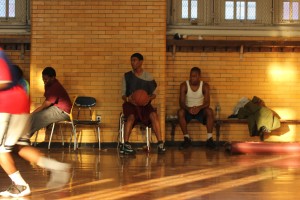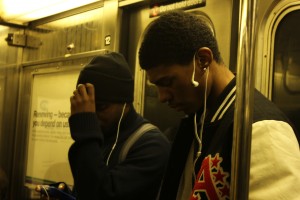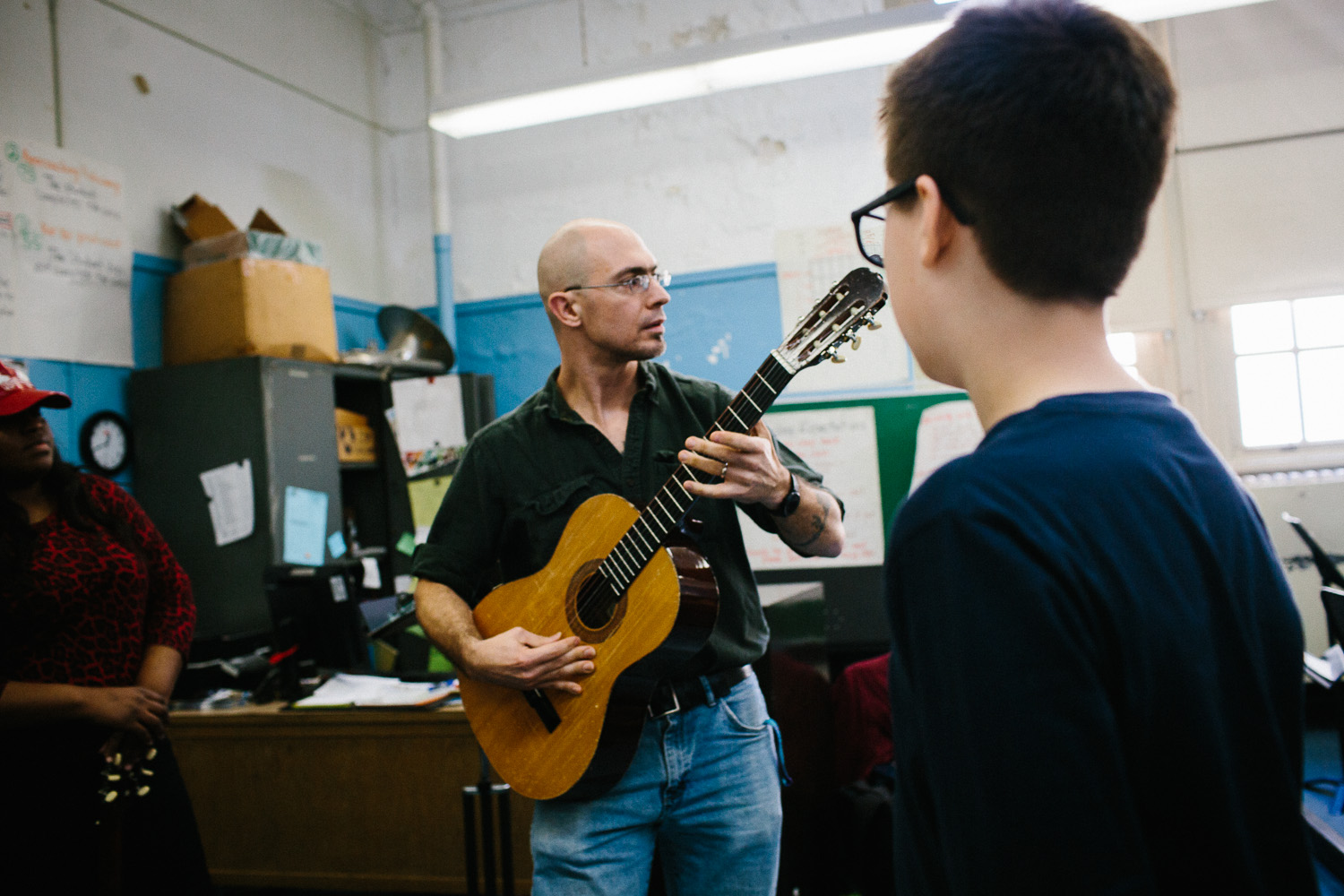The team thundered up and down the basketball court at Opportunity Charter School to the symphony of squeaking sneakers, low grunts and the coach’s whistle. Larry Utendahl grabbed the ball and jumped with both feet in the air to make a shot. Swish.
The ball dropped straight into the hoop as it usually does for Utendahl. Still, frown lines creased his forehead. Normally, when the 17-year-old Harlem teen smiles, he has a childish grin that’s framed by a neatly trimmed mustache. But Larry was not smiling much that February afternoon.
“They’re not doing their job,” Utendahl complained to his coach after practice ended. “I gotta get rebounds. Nobody wants to get rebounds.” He sulked on a wooden bench until the coach checked up on him.

“Yeah, they were kind of slacking off. I thought you were posing or something,” coach Jennifer Marshall said, wondering what was going on with her most reliable player, the one who usually fosters the team spirit.
“No, I was upset. You didn’t hear me yelling back and forth on the court?” Utendahl said, slumping his shoulders in frustration. “They played mad scared.”
“All right. We got one more day,” said Marshall, almost to herself as she thought ahead to the next game. The team was already 1-3 into the season.
Life according to the 5-foot-10-inch teen consists of three things: basketball, dance, school — in that order. Even at his young age, he knows his list should be less narrow, less confined to Harlem, and more focused on opportunities beyond. As the youngest of four children brought up by a single mother in the Grant Houses, the odds are already against him.
A 2010 report by the Schott Foundation found that the nationwide high school graduation rate for black male students is disproportionately low. New York City’s rate was one of the lowest in the country at 32 percent. And for black students who graduate from high school, only 12 percent are considered college ready, according to a 2011 city report that helped to create the mayor’s Young Men’s Initiative program that hopes to close the achievement gap of black and Latino male students.
Utendahl is all too aware of his limited surroundings. He grew up in Harlem’s Grant Housing projects. “What’s the majority of guys now days?” Larry said, as a matter of fact. “Just thugs and gangsters. When’s the last time you see people come out of these types of projects wearing a suit? I rarely see it and I live here.”
Utendahl’s teachers at Opportunity Charter, on 113 Street in central Harlem where he is a senior, believe that it’s possible for him to overcome the statistics.
“Larry can do it if Larry puts his mind to it. Definitely without a doubt,” said Veronica Polanco, a teacher at Opportunity Charter who teaches eighth grade English. She sat on a desk in the crowded teacher’s lounge. Polanco, who’s in her first year of teaching at Opportunity, met Utendahl last October. “He’s the kind of kid that will carry your bag,” Polanco recalled.
It’s the morning after the basketball practice. She hasn’t greeted Utendahl yet but they will likely run into each other later that day because she likes to keep track of him.

“There are a lot of kids that are sitting in here that should be seniors but they’re not,” said Polanco, gesturing around the room. “They’re stuck in a tenth grade class. So it says a lot for Larry that he’s on track in this environment. And I don’t mean this building, I mean in this Harlem environment.” Another teacher who was marking papers at the desk looked up to grab Polanco’s attention. She told Polanco that Utendahl aced his creative writing test. Polanco beamed proudly.
Utendahl’s academic record is fine, but not solid. He will have to retake the history Regents exam that he failed. He also failed his trigonometry class. And his guidance counselor, Brendan Thomas, is still waiting for Utendahl’s college applications. “He had a little bit of a senioritis in the first semester of the school year, so it kind of reflected in some of his performance in class,” said Thomas.
Still, Utendahl has a lot to be proud of. Thomas said that Larry is still in the top 10-15 percent of the senior class despite his academic stumble earlier this year. He is probably one of three or four male students to earn this achievement.
Both Polanco and Thomas describe Utendahl as a good student who, like most kids his age, just needs to focus. He’s already ahead of most of his classmates, especially those who are nowhere close to graduating but who are, like Larry, getting ready to celebrate their 18th birthday this year.
But circumstance may keep holding Utendahl back even though he’s determined to go to college.
His resources are limited to the opportunities available to him. His school regularly performs below the city average — only 12 percent of students were able to earn a Regents diploma in four years. The school recently received a two-year renewal after the city almost closed the school because of poor test scores. Opportunity is crowded with nearly 500 students in two floors in a building shared with two other schools including Harlem Success Academy, that is part of a well-financed charter network.
Utendahl’s mother tried to pull him out of the school after she learned, following a city investigation, that some students were physically restrained and abused. But she felt that Brandeis High School, the local district school that she attended, wasn’t the better option.

Just as school officials were undergoing public criticism, Utendahl encountered his own safety issue when a classmate started to bully him. An older and much larger male student started a fight with Larry in a school restroom after weeks of harassing him. He slammed Utendahl to the floor as other students stood around, watching and egging them on. Utendahl doesn’t remember much of what happened but he saw the video of the fight that another classmate took. Utendahl’s left hook won.
“I sat down in the corner and I had to breathe,” Utendahl recounted, about the aftermath of the fight. “It was like all the adrenaline and all that just left my body. My back was in pain. It was a horrifying experience.” When his bully tried to follow him home to start another fight, Larry reluctantly told school officials.
“That was my first real fight and, if I can help it, my last. I don’t want another one of those. I can’t handle another one of those,” said Larry, speaking softly.
Circumstances like these, the lack of resources and the outburst of violence, are difficult to ignore. No one needs to tell that to Liz Pellot, Utendahl’s mother.
Pellot, is strict — she enforces a 9 p.m. weekday curfew — to make sure that her only son stays on track. She’s fighting her own set of statistics as a single mother. She’s 46 years old and hopes that she won’t become a grandmother anytime soon. Her three daughters have graduated high school. Utendahl’s the last one left and Pellot is determined to make sure he graduates.
“I’ve done the best job I can as a mother. The very, very best job I can,” Pellot said, looking accusingly at her son as they both sat in the living room of their three-bedroom apartment at the Grant Houses.
It’s the weekend and both mother and son were upset. Utendahl’s normally cheerful disposition was soured because the basketball team lost its last game by 1 point.
He practically whispered the game details because the loss was still too fresh to talk about. Pellot, cooking in the kitchen, was upset because the apartment was messy.
“Let’s not talk about the pots. Let’s not talk about mopping,” said Pellot, her words flavored by her Puerto Rican heritage. “Let’s not talk about sweeping. If I don’t do all of that, it doesn’t get done around here and I’m pretty much tired.
Larry’s father left when he was 7 years old. When a father abandons his family, he leaves behind stress and financial strain, all of which Pellot knows too well. Her father also left the family.
Whatever the cause, the relationship between mother and son is strained. Her salary as a school assistant was recently reduced because of budget cuts. She feels overworked and presses upon her youngest child to do house chores. Utendahl feels dominated by the women in his life — he’s usually bossed around because he is the youngest.
“I know it’s rough on him not having a male figure, but what can I do about that?” said Pellot, who, wearing hoop earrings and a black baseball cap that covered her wavy brown hair, looked younger than her age. “It’s not my fault.”
These are just some of the consequences of an absent father who is sporadically involved with his son’s life. Utendahl is rarely in contact with his father, who happens to be the nephew of Wall Street banker John Utendahl. The high finance connection doesn’t seem to make any difference in their lifestyle.
Still, Utendahl is optimistic about his future. He dreams of a future that has outgrown the confines of his reality. His life may be complicated but his goals are simple. Graduate from high school in four months. Go to college. Settle down with a wife and family. Become a veterinarian.
His sisters gave him a book about animals when he was younger. It’s one of the few books he owns and enjoys reading.
“I want a whole lot of things,” said Larry, “But it’s all riding on my education right now.”
His earnestness makes it hard not to root for him.



